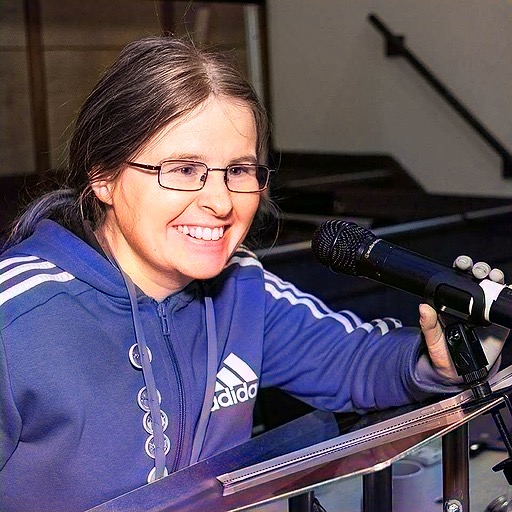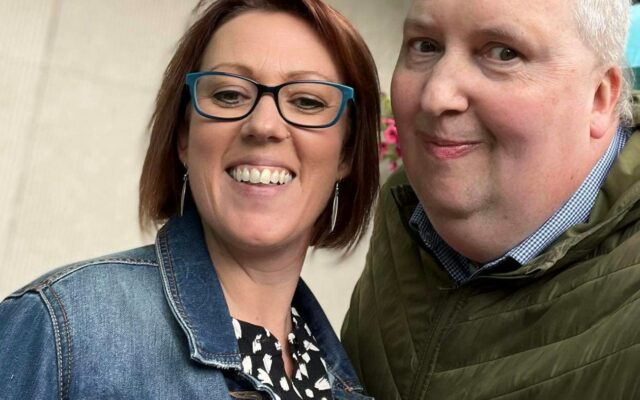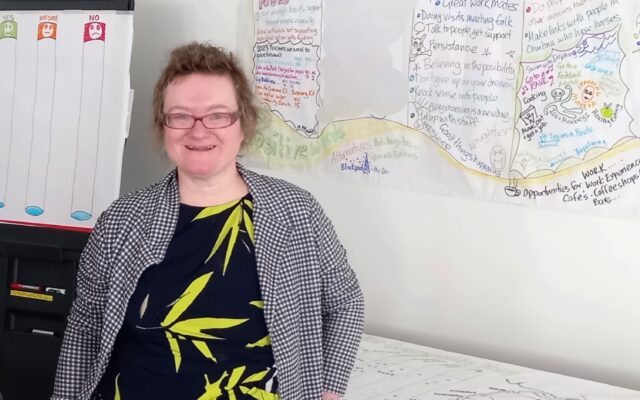Jenny Carter is a self-advocate and a founder and a director of Together All Are Able. It is “a self-advocacy organisation and group based in the Wirral which is truly disability led and run”, she says.
When we spoke, Carter told me about how she and her colleagues set up Together All Are Able 10 years ago.
But first she told me about growing up. She was born in Liverpool but, by the time she went to school, she and her parents and younger sister had moved across the Mersey to the Wirral.
Carter went to a mainstream school “but I got extra support from special educational needs. So I was actually statemented and stuff.”
Her school experience was “reasonably good” but she felt let down by the careers advice: “It wasn’t great. We were never told that there was self-advocacy. It was like admin, catering and things like that. And, I’m thinking to myself, admin can be quite boring. I like self-advocacy so much because each day is different.”
Towards the end of her school days, Carter and her friend Vicky Forfar found out about a course called Partners in Policymaking.
Originating in the US, the course aims to give people who use disability services the knowledge and skills to influence policy. Around the same time, they became part of a young people’s self-advocacy group called We R Able 2.
Carter left school after her first year of sixth form.
She went on to a work placement but, after making a mistake there, was told “your placement has gone west so we are going to finish you”.
“Yes, I made a mistake but they said ‘we are not going to let you back’,” she says.
A friend helped Carter secure a job at Wirral’s Oval Sports Centre doing admin. Meanwhile, she and Forfar had finished the Partners in Policymaking course and, as a result, the council was starting to involve them in various matters.
Then came another admin job for a couple of years with an NVQ service.
“I didn’t feel I was treated very well to the point that when they reorganised the admin team – I was the only one to have a disability and the only one to be made redundant,” she says.
Carter met a manager at the NVQ service who said they had not realised how bad things had been for her. “I said ‘you know what, I keep quiet because I don’t think nobody would believe me half the time’.”
Then she joined the Disability Consultancy Service. Again, it was not always welcoming.
“There were issues and difficulties that me and my best mate, we had to deal with and go through,” she say. “It wasn’t very nice to be honest.”
I ask Carter if she had had any advocacy herself at this time. “No I didn’t really have any advocacy support. It was like I have got to do this on my own. It’s not right but…”
Did that fuel her passion for self-advocacy? “Yeah you could say that,” she replies.
“The self-advocacy side of it I am really passionate about because, you know, we need to be listened to, but we also need to be heard.
“Which I said to the council meeting on Wednesday: I don’t want to just be present – I want to be heard, thank you!” She laughs.
“And we want you to work with us.
We don’t want you to do something about us without us. We need to be seen and heard.
“Not just seen there, as a token, like: ‘we have got somebody with autism in the room, tick’. Yes, you have got somebody with autism in the room, but are you listening to them? Are you talking to them?”
Perhaps the lowest point for Carter and Forfar was when the local disability umbrella body asked them to reduce their involvement with advocacy.
“They decided that we were too old to be part of it any more. They [said they] wanted to get younger people in. It was because of the work we were doing. I don’t think they agreed with what we were telling them. Reading between the lines, the message was ‘Shut up and go away’.”
The good news is that out of that came Together All Are Able. It took a year to set it up and it was registered as a community interest company in late 2011.
I say to Carter, if that was a battle, you actually won, didn’t you?
“Yeah,” she says. “Those people who decided they didn’t want us. Well, they lost, didn’t they? Everyone has gone that actually was being a pain in the arse. We outlasted them all. Yay!”
She laughs then is suddenly fierce: “You know what? You want to have a battle with us? You’re gonna lose!”
Obviously, it was a tough time but Carter says she was prepared because she could see it coming.
She says she is often able to see the direction in which things are going because her autism helps her to read the signs at an early stage.
This was evident when she and Forfar lost their work at the local disability group: “I could actually see it was going to be really hard. They don’t want us any more. And it all came to reality. I was like: ‘Wow. I actually saw that and it actually happened.’
“I could say my autism is a gift because
I see stuff before it happens a lot of the time.”
Working the week
As well as being a director of Together All Are Able, Carter is one of the local leads for self-advocacy.
“It’s unpaid, by the way,” says Carter. She is happy to work voluntarily because she believes in the importance of self-advocacy. She often works a full, five-day week, frequently online.
“I think the most meetings that we did on Teams or Zoom in one day was about six,” she laughs. “On average, it’s about four or five meetings a day.”
I ask Carter to give me an example of the kind of thing that Together All Are Able might help someone with, and I must admit I am surprised by her answer.
“Well, one thing would be friendship. Sometimes we actually stop the person being bored.”
How? “We have open events that anyone can be involved with and then we actually say: ‘This is going on and if you fancy joining us then join in’.
“It’ll be things like the council having a consultation meeting about its budget. There are some meetings that are just for certain people, but there are other meetings that we can turn up at mob-handed,” she laughs.
Together All Are Able often works with the local council but Carter stresses that most of their income comes from organisations outside the Wirral, often national bodies.
In addition, Pathways and Think Local Act Personal have funded their work promoting personalisation and community-based support in health and care.
Carter is strongly committed to co-production, a process in which people who use services and carers are included as equal partners and share power and decision-making. She is on the national co-production advisory group of Think Local Act Personal.
She is also an adviser with You Know, which offers independent knowledge and help about accessing care services.
Jayne Knight, who founded You Know, says: “Jenny Carter is an inspirational, hard-working woman who has true insight and dedicates her life to others. She’s great fun too.”
Award opens doors
In 2016, Carter was made a lifelong member of Learning Disability England. Then, in 2018, she won the Derek Russell award for outstanding leadership in advocacy in the North West.
She tells me now that receiving the award “felt like a turning point” and, since then, Together All Are Able has had better access to people who make decisions “like the director for adult social services”.
Carter is also a member of the local Transforming Care group, which is trying to get people out of assessment and treatment units. She says that, while the group is doing satisfactorily in terms of getting people moved out, what is really concerning is that young people are still going in to these institutions.
Inspirations
I ask Carter who inspired her in this work when she was younger and the first person she mentions is personalisation consultant Helen Sanderson MBE.
“Helen was one of the people I looked up to. I just liked the way she was.”
In return, Sanderson recognises Carter as “a dedicated and committed self-advocate leader”.
Carter was also inspired by John Evans OBE, a disability activist, who was on the National Co-Production Advisory Group with her. Carter had wanted to meet him after hearing him tell his story in an online video. “I am friends with him on Facebook now,” she says.
In closing, I ask her what she would say if she met her younger self.
She is thoughtful for a few moments before quietly saying: “It’s OK. It’s OK that you are autistic. That is OK. It is OK that you can see things before they happen. It’s OK!”
It is a remarkable moment of self-belief. Carter sounds exactly as though she is comforting a young person and, for that moment, I am given a powerful glimpse not only of what she has been through but also of the compassion and concern that have sustained her.





